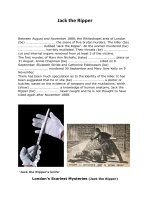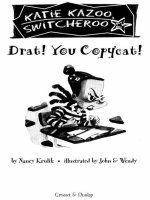Copycat Ripper
Bạn đang xem bản rút gọn của tài liệu. Xem và tải ngay bản đầy đủ của tài liệu tại đây (161.04 KB, 11 trang )
Copycat Ripper
Bryan Stark
Chapter 1
Detective Chief Inspector John Anderson walked across the grass and stood just inside the taped-
off area, well away from the activity in the centre of the park. He was not pleased. Five minutes
later Comben joined him. Anderson waited but his new Detective Sergeant said nothing.
Then Anderson raised his left hand so that the sleeve of his coat slipped easily over the thin
disc of his watch and fell back down his arm. Black hands and black Arabic figures showed up
well on the dulled-metal dial and showed it was a few minutes past six. He nodded in Comben‘s
direction. The younger man raised his own hand but had to push his sleeve over the bulk that
Anderson imagined was some sort of multi-functioning computer. The figures could have been
read from a yard away but Anderson stooped and read off 06.04.
‗Sorry sir,‘ said Comben.
Anderson didn‘t reply; he‘d made his point. He did expect his sergeants to be quicker off
the mark. He had no doubt that Comben slept sounder and longer than he did himself and it was
true that the phone call from the station hadn‘t woken him: the first light of dawn creeping round
his curtains had done that. But he had taken his time getting there: two – or was it three – cups
of Lavazza, a shower and then he always took a little time deciding what to wear.
He felt the pang of an unhealed wound as he thought about his clothes and he was not quick
enough to stop his mouth twitching into a grimace. Whenever he stood in front of his wardrobe,
he still yearned to put on the suits that hung to the left – the pre-Comben clothes – but he never
did. He had his old Detective Sergeant, Patricia Fielding, to thank for that and now, as a newly
promoted Detective Inspector, she reminded him about it every time they met in the station. Not
that she said anything – she wouldn‘t say anything – but her eyes were more expressive than
words could ever be, as they examined the texture and shade of his suits.
Anderson dragged his mind away from the unpleasantness. He was in time to put his arm
out and restrain his sergeant as the man turned towards the centre of the park. ‗Let the scene-of-
crime officers do their job,‘ he said. ‗This isn‘t a TV show and the fewer people tramping over
the ground the better.‘
Anderson turned away from the hubbub and looked behind him at the rows of houses across
the street. There was no sign of movement: no early worker opening doors and glumly setting
out; no sounds of cars being started up; milk bottles stood untouched on doorsteps. This was not
working-class land and the occupants were not expected in their offices before ten, if they
worked at all. It was the best street in the neighbourhood, overlooking Queen‘s Park; Anderson
held no hope of anyone across there having seen anything over here. They had canvassed the
street before, after they found the first body and nothing had come out of it. Still, they would
have to do it again.
Anderson turned back and saw that the activity had died down, so he sent Comben across.
The Detective Sergeant came back and told Anderson what he already knew from the phone call
earlier: it was a second strangulation of a middle-aged woman and she had died elsewhere. The
murderer had carried the body to the park, pushed it over the railings, climbed over himself and
then dragged it across the grass. Only after he had been done all this, had he mutilated the
corpse. However, this one was different and Anderson had to trek across to see.
The first had multiple stab wounds; this one had been partly eviscerated. A memory tugged
at Anderson‘s mind but he didn‘t struggle to bring it to the surface. It would come soon enough.
As he leaned forward, the tails of his long coat struggled towards the corpse — not far, since
he had fastened each button carefully before walking across, although it wasn‘t cold. He drew
the coat back and, as he did so, he wondered what had happened to him. When was it that he
became more worried about contaminating his coat than the tragedy that lay before him?
He looked up at the faces around him. No, he wasn‘t the only one. He was surrounded by
cool, unemotional expressions. Familiarity, that was what it was. Homicides hadn‘t yet reached
American levels but they were getting there.
Clarissa looked again at the story she had been reading. This was the writer‘s second attempt.
The first had contained a violent murder and this one did too but was more special. It contained
details of a slashed throat and an abdomen sliced from top to bottom. She was sure that she
knew where the idea had come from.
She walked into Mark‘s room. Sugden‘s book was easy to find on Mark‘s bookshelf: it
looked forlorn and lonely with only two or three others to keep it company. She flicked over a
few pages and there it was — Martha and now Poole with intestines hanging around all over the
place. Her anonymous writer was basing his stories on Jack the Ripper and putting them into a
modern setting. Well she supposed it was a legitimate strategy, although it wasn‘t a genre she
favoured. Still, she was there to criticise quality not subject matter.
She didn‘t like being too critical of students‘ work, they were too easily discouraged but she
judged that the gory descriptions had taken over in the second story and that the plot and the
characterisation had become sketchy. So that was what she decided to write on the typescript.
But had her distaste for the subject matter spilled over and influenced her critical judgement?
She had a little struggle with herself and decided it hadn‘t.
As she wrote, she heard his footsteps on the path but she didn‘t get up. Then came the rattle
of his key in the lock, the sound of the door slamming behind him and there he was. She could
see him out of the corner of her eye, standing in the doorway of her study. But she didn‘t stir
until he flung the newspaper on to her desk, which he did every evening. Then and only then did
she jerk her head back in mock surprise.
‗I‘m home from work darling,‘ he said, ‗what‘s for dinner?‘
She looked up at him through her reading glasses. The outline of his face was blurred —
another sign of ageing: needing two sets of glasses.
‗Work‘, every evening he insisted on using that word, as though she didn‘t know where he
had been all day. Yes, he went out to work and she stayed at home, so apparently she must cook.
It didn‘t matter that she owned the house and paid for everything in it and that his money – hard-
earned money she was sure he would say – paid solely for his amusements: entertainment that
excluded her.
Was this the price for marrying a younger man? She took off her reading glasses and put
her others on to get him into focus. The effort was worth it. She could see why she had to have
him. It was part of her spree when she was best selling author of the year. She had decided to
spend: the house, clothes, a divorce and then a beautiful new man to adorn the whole edifice.
And there he was — blond hair, square shoulders and firm muscles, kept that way by adequate
but not excessive exercise. Six foot two of male pulchritude without an unsightly bulge — it
was a pity that he didn‘t choose to use his body to please her.
During her first marriage, she had learnt the truth of the old saying that if you put a sixpence
in a pot for every time you made love during the first year of a marriage and then took one out
each time subsequently, it would take ten years to empty the pot. This time it applied equally to
the number of evenings they spent together. She didn‘t know who he was fucking but she was
damn sure she wasn‘t going to subsidise it for much longer.
She might not have published for a year her last effort had been refused: she had wanted
to do something better but her publisher did not agree and she may now be occupied earning
peanuts teaching others to write but she had no intention of becoming a dutiful housewife. Nor
had she the inclination to keep her husband in the style to which he wished to become
accustomed. Not that she couldn‘t have, had she wanted. The royalties kept flooding in and she









